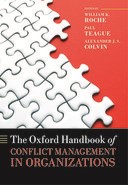 The Oxford Handbook of Conflict Management in Organizations
The Oxford Handbook of Conflict Management in Organizations
Contents
-
-
-
-
-
-
-
-
-
-
-
-
-
Introduction Introduction
-
Traditional Key Institutions of Dispute Resolution Traditional Key Institutions of Dispute Resolution
-
The German Court System The German Court System
-
The “Dual System” of Interest Representation The “Dual System” of Interest Representation
-
Grievance Right Grievance Right
-
Arbitration Panels Arbitration Panels
-
-
Advances in the Institutions of Dispute Resolution Advances in the Institutions of Dispute Resolution
-
Non-Statutory Representation Bodies Non-Statutory Representation Bodies
-
Anti-Discrimination Law Anti-Discrimination Law
-
Mediation Law Mediation Law
-
-
Evolution of Established Practices Evolution of Established Practices
-
Is the Dual System Still Dual? Is the Dual System Still Dual?
-
Dispute Resolution and Economic Shocks Dispute Resolution and Economic Shocks
-
-
Conclusion Conclusion
-
Notes Notes
-
References References
-
-
-
-
-
-
-
-
-
-
17 Conflict Resolution in Germany
Get accessMartin Behrens is Programme Director at the Institute of Social and Economic Research in the Hans Böckler Foundation (WSI) and Lecturer at the Institute for Sociology at the University of Göttingen. His research focus is on comparative industrial relations and on German employers’ associations, works councils, and labor unions. Recent publications include Das Paradox der Arbeitgeberverbände (The Paradox of Employers’ Associations) (Edition Sigma, 2011) and ‘Still Married after all these Years? Union Organizing and the Role of Works Councils in German Industrial Relations’, Industrial and Labor Relations Review, 2009, 62: 275–93.
-
Published:16 December 2013
Cite
Abstract
Referring to the term “conflict partnership” the chapter investigates the way by which German key institutions of employment relations keep work-related conflict within bounds. At the center of this analysis is the duality between industry-level collective bargaining and works councils—the key representative bodies at the plant level. Traditional conflict resolution procedures such as arbitration panels and grievance rights are analyzed as well as recent additions to this system such as anti-discrimination laws. While there is little reason to assume this system has been destabilized during the world financial crisis, the author argues that major challenges come from the long-term process of decentralizing collective bargaining.
Sign in
Personal account
- Sign in with email/username & password
- Get email alerts
- Save searches
- Purchase content
- Activate your purchase/trial code
- Add your ORCID iD
Purchase
Our books are available by subscription or purchase to libraries and institutions.
Purchasing information| Month: | Total Views: |
|---|---|
| October 2022 | 4 |
| November 2022 | 5 |
| December 2022 | 3 |
| January 2023 | 1 |
| March 2023 | 1 |
| May 2023 | 1 |
| June 2023 | 4 |
| July 2023 | 2 |
| August 2023 | 2 |
| September 2023 | 3 |
| October 2023 | 2 |
| November 2023 | 5 |
| December 2023 | 1 |
| March 2024 | 2 |
| April 2024 | 2 |
| June 2024 | 2 |
| September 2024 | 1 |
| October 2024 | 1 |
| December 2024 | 1 |
| January 2025 | 1 |
| February 2025 | 2 |
| April 2025 | 2 |

Get help with access
Institutional access
Access to content on Oxford Academic is often provided through institutional subscriptions and purchases. If you are a member of an institution with an active account, you may be able to access content in one of the following ways:
IP based access
Typically, access is provided across an institutional network to a range of IP addresses. This authentication occurs automatically, and it is not possible to sign out of an IP authenticated account.
Sign in through your institution
Choose this option to get remote access when outside your institution. Shibboleth/Open Athens technology is used to provide single sign-on between your institution’s website and Oxford Academic.
If your institution is not listed or you cannot sign in to your institution’s website, please contact your librarian or administrator.
Sign in with a library card
Enter your library card number to sign in. If you cannot sign in, please contact your librarian.
Society Members
Society member access to a journal is achieved in one of the following ways:
Sign in through society site
Many societies offer single sign-on between the society website and Oxford Academic. If you see ‘Sign in through society site’ in the sign in pane within a journal:
If you do not have a society account or have forgotten your username or password, please contact your society.
Sign in using a personal account
Some societies use Oxford Academic personal accounts to provide access to their members. See below.
Personal account
A personal account can be used to get email alerts, save searches, purchase content, and activate subscriptions.
Some societies use Oxford Academic personal accounts to provide access to their members.
Viewing your signed in accounts
Click the account icon in the top right to:
Signed in but can't access content
Oxford Academic is home to a wide variety of products. The institutional subscription may not cover the content that you are trying to access. If you believe you should have access to that content, please contact your librarian.
Institutional account management
For librarians and administrators, your personal account also provides access to institutional account management. Here you will find options to view and activate subscriptions, manage institutional settings and access options, access usage statistics, and more.